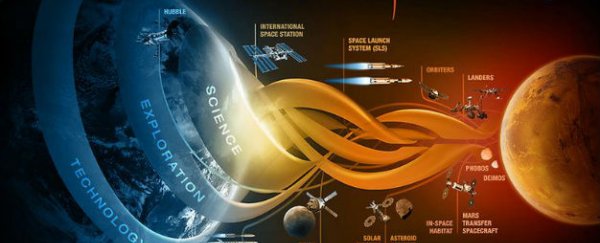In a live webcast, NASA has announced that it's on its way to taking humans further than they've ever been before, with the planned December 4 test flight of their Orion space capsule - the spacecraft that they say will soon take humans to the Red Planet.
According to Ryan Barrell at The Huffington Post, launching with the Space Launch System rocket, Orion will orbit the Earth twice for the first time on a 4.5-hour unmanned mission called Exploration Flight Test-1 to test various systems such as its 1,200 sensors and launch abort system. The capsule will be flying at about 5,800 kilometres above the Earth, which is roughly 15 times the height that the International Space Station is orbiting at.
When it's done, the capsule will splash down into the Pacific Ocean, and the US Navy will pick it up.
"We do have radiation sensors on board, for example, so we're actually measuring different parts of the vehicle for what we're seeing, what the environment is inside," Orion program manager Mark Geyer told the press today. "We have 1,200 sensors, and a lot of those are loads, so they measure the impact loads when we land [and during] ascent. We'll get acoustic data inside and out, so we know how loud it is - those kinds of things. A lot of that is for the vehicle, but it's also to understand what the environment for the crew is going to be."
If all goes well, the four-person capsule will be set to carry a crew to an asteroid and then to Mars, and NASA predicts they'll land on the Red Planet by mid-2030.
"It will also be the first time since the Apollo missions that a human has gone further than Lower Earth Orbit," says Barrell at The Huffington Post.
Miriam Kramer at Space.com lays out the schedule:
All in all, the Orion test flight should take about 4.5 hours. The test's 2-hour-and-39-minute launch window opens at 7:05 a.m. EST (1205 GMT) on Dec. 4. Splashdown should happen at about 11:29 a.m. EST (1629 GMT) if all goes according to plan.
You can watch the live webcast of the Orion test launch tomorrow at NASA's TV site.
Representatives from NASA, including Geyer, have been participating in a Reddit AMA today, which you can read and participate in here.
Click to view a larger version of the image above
Sources: The Huffington Post, Space.com
